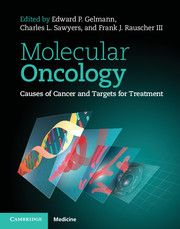Book contents
- Frontmatter
- Dedication
- Contents
- List of Contributors
- Preface
- Part 1.1 Analytical techniques: analysis of DNA
- Part 1.2 Analytical techniques: analysis of RNA
- Part 2.1 Molecular pathways underlying carcinogenesis: signal transduction
- Part 2.2 Molecular pathways underlying carcinogenesis: apoptosis
- Part 2.3 Molecular pathways underlying carcinogenesis: nuclear receptors
- Part 2.4 Molecular pathways underlying carcinogenesis: DNA repair
- Part 2.5 Molecular pathways underlying carcinogenesis: cell cycle
- Part 2.6 Molecular pathways underlying carcinogenesis: other pathways
- Part 3.1 Molecular pathology: carcinomas
- 42 Head and neck cancer
- 43 Lung cancer
- 44 Esophageal cancer
- 45 Gastric cancer
- 46 Small-bowel tumors: molecular mechanisms and targeted therapy
- 47 Colon and rectal cancer
- 48 Pancreatic cancer
- 49 Hepatocellular carcinoma
- 50 Renal-cell carcinomas
- 51 Bladder cancer
- 52 Prostate cancer
- 53 Targeted therapies in breast cancer
- 54 Molecular targets for epithelial ovarian cancer
- 55 Testicular cancer: germ-cell tumors (GCTs)
- 56 Cervical cancer
- Part 3.2 Molecular pathology: cancers of the nervous system
- Part 3.3 Molecular pathology: cancers of the skin
- Part 3.4 Molecular pathology: endocrine cancers
- Part 3.5 Molecular pathology: adult sarcomas
- Part 3.6 Molecular pathology: lymphoma and leukemia
- Part 3.7 Molecular pathology: pediatric solid tumors
- Part 4 Pharmacologic targeting of oncogenic pathways
- Index
- References
47 - Colon and rectal cancer
from Part 3.1 - Molecular pathology: carcinomas
Published online by Cambridge University Press: 05 February 2015
- Frontmatter
- Dedication
- Contents
- List of Contributors
- Preface
- Part 1.1 Analytical techniques: analysis of DNA
- Part 1.2 Analytical techniques: analysis of RNA
- Part 2.1 Molecular pathways underlying carcinogenesis: signal transduction
- Part 2.2 Molecular pathways underlying carcinogenesis: apoptosis
- Part 2.3 Molecular pathways underlying carcinogenesis: nuclear receptors
- Part 2.4 Molecular pathways underlying carcinogenesis: DNA repair
- Part 2.5 Molecular pathways underlying carcinogenesis: cell cycle
- Part 2.6 Molecular pathways underlying carcinogenesis: other pathways
- Part 3.1 Molecular pathology: carcinomas
- 42 Head and neck cancer
- 43 Lung cancer
- 44 Esophageal cancer
- 45 Gastric cancer
- 46 Small-bowel tumors: molecular mechanisms and targeted therapy
- 47 Colon and rectal cancer
- 48 Pancreatic cancer
- 49 Hepatocellular carcinoma
- 50 Renal-cell carcinomas
- 51 Bladder cancer
- 52 Prostate cancer
- 53 Targeted therapies in breast cancer
- 54 Molecular targets for epithelial ovarian cancer
- 55 Testicular cancer: germ-cell tumors (GCTs)
- 56 Cervical cancer
- Part 3.2 Molecular pathology: cancers of the nervous system
- Part 3.3 Molecular pathology: cancers of the skin
- Part 3.4 Molecular pathology: endocrine cancers
- Part 3.5 Molecular pathology: adult sarcomas
- Part 3.6 Molecular pathology: lymphoma and leukemia
- Part 3.7 Molecular pathology: pediatric solid tumors
- Part 4 Pharmacologic targeting of oncogenic pathways
- Index
- References
Summary
Introduction
Colorectal cancer (CRC) represents roughly 10% of all new cancer cases worldwide each year, making it the third most common cancer and the second most common cause of cancer-related death. The National Cancer Institute estimates that in 2009 in the United States, there will be 106100 colon and 40870 rectal cancers newly diagnosed, and 49920 deaths. Colon cancer affects both sexes with equal frequency, although rectal cancer has nearly double its occurrence in men. The incidence of CRC worldwide varies greatly, with much higher rates in Western populations. Interestingly, incidence amongst immigrants to countries with higher rates of CRC rapidly reaches the rates of the host population, suggesting that diet and environment are major contributors to risk (1,2). A set of genetic alterations have been well defined as key regulators of colorectal cancer onset and progression. These genetic contributors to CRC are the focus of this chapter, along with current therapies for the treatment of CRC. Ongoing research efforts will further define the molecular events leading to CRC onset and improve personalized treatment options.
Staging and histopathology of CRC
Colon and rectal cancers are often discussed synonymously because they share many common factors. Most CRCs begin as benign polyps, or adenomas, anywhere in the gastrointestinal tract, from cecum to rectum, that then become invasive (3). Stage is defined by several factors, but most importantly by tumor size, degree of invasion, regional lymph node involvement, and distant metastasis. The tumor stage upon diagnosis largely predicts the survival outcomes and influences the particular course of treatment.
- Type
- Chapter
- Information
- Molecular OncologyCauses of Cancer and Targets for Treatment, pp. 547 - 556Publisher: Cambridge University PressPrint publication year: 2013



